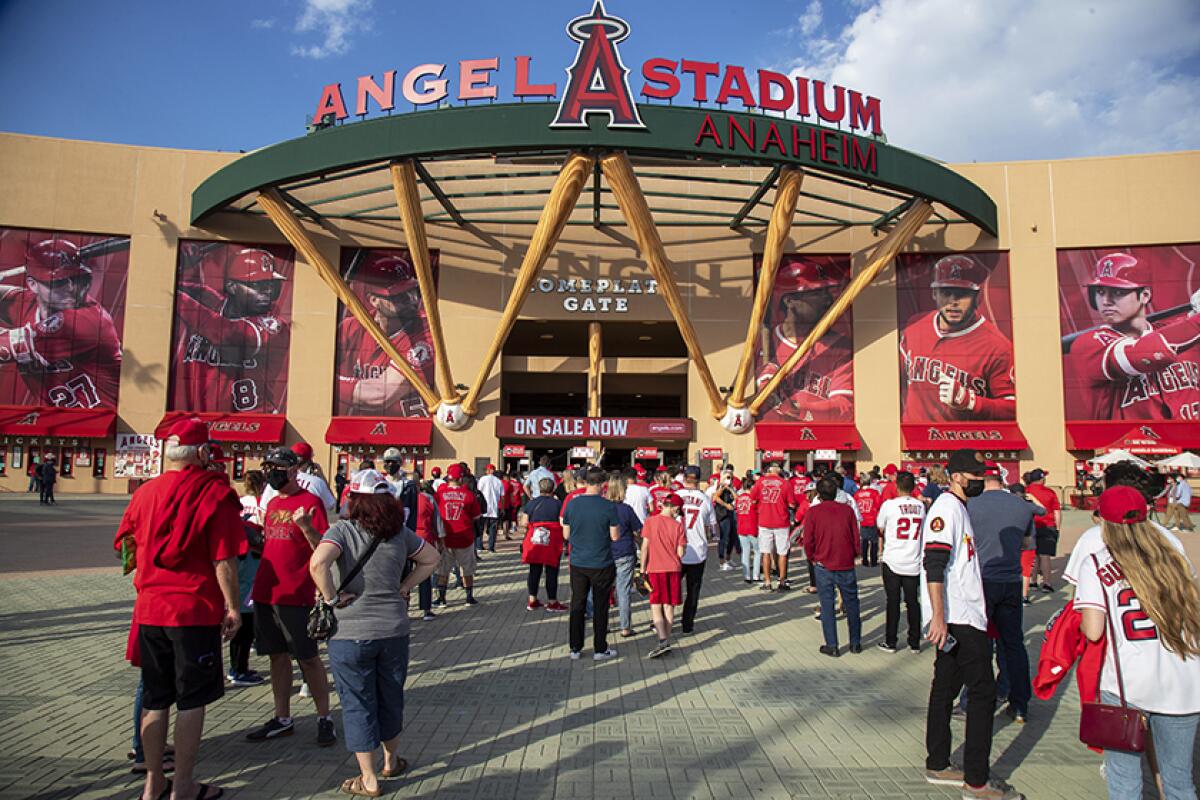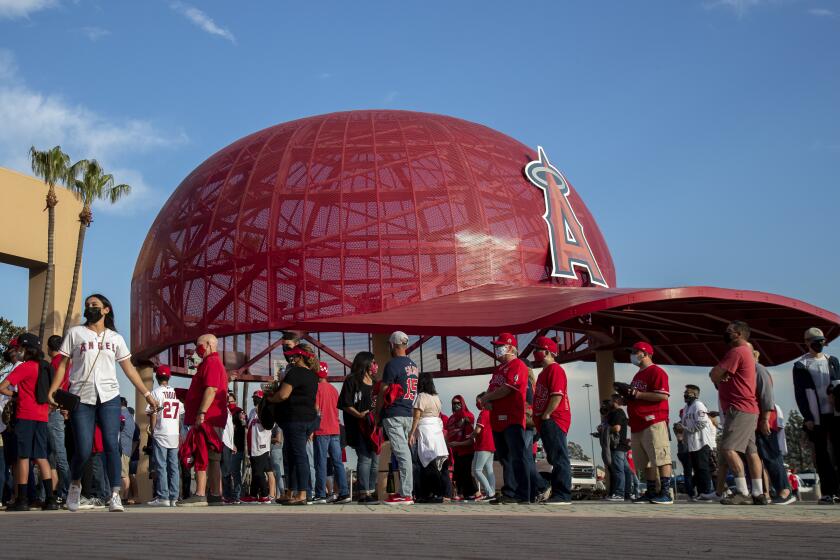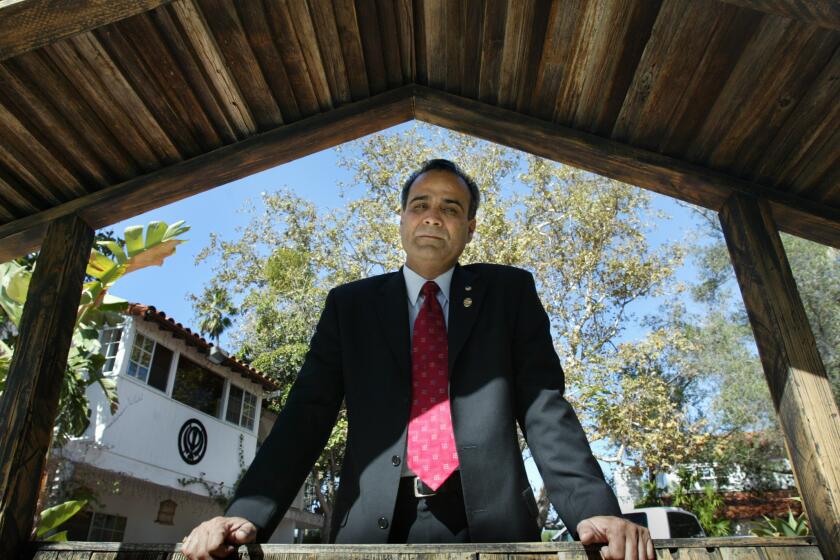Angels to Anaheim: You’re on the clock to approve stadium sale

Facing community pressure to delay or cancel the Angel Stadium sale amid a corruption investigation into Anaheim Mayor Harry Sidhu, the Angels on Friday gave the Anaheim City Council 25 days to grant final approval to the deal.
In a letter obtained by the Los Angeles Times that was sent on behalf of the Angels and SRB Management, and eventually made public, the development company led by Angels owner Arte Moreno, attorney Allan Abshez told the city that the team and SRB “have acted in good faith” and expect “that the parties will complete the transaction.”
In concluding the letter, Abshez wrote: “SRB has met all its obligations and has every expectation that this transaction should move forward, and looks forward to the Council’s final action no later than June 14, 2022.”
Angels letter to City of Anaheim.
Abshez did not say how the Angels and SRB might respond if the council declines to finalize the deal on that timetable. The deal has not closed, so Moreno can walk away from it.
The council has two scheduled meetings before the Angels-imposed deadline, one on Tuesday and the other on June 7. The council can also call a special meeting so long as it is limited to a single subject.
On Tuesday, an Orange County Superior Court judge placed a hold on a proposed settlement between the city and state, considered the last major obstacle to finalizing the sale. The California attorney general requested the hold on Monday, disclosing the corruption investigation and saying the allegations “call into question” the validity of the settlement and perhaps of the sale itself.
In 2019, the city agreed to sell the 150-acre stadium site for $320 million, with $124 million of that amount credited to Moreno so he would build affordable housing on the property. The state housing agency said the city had violated California affordable housing law by not first offering the property to housing developers.
Under the settlement, called a stipulated judgment, the city would pay $96 million — the amount it was liable to be fined — into a fund to build affordable housing elsewhere in the city. Moreno agreed to return $96 million worth of those credits — in cash — and in exchange the city excused him from building four of every five proposed affordable housing units.
The California Department of Housing and Community Development (HCD) last week told The Times that the revised agreement between the city and state — called a disposition and development agreement (DDA) — should be rejected by the City Council.
Records from an FBI probe show how business interests run the Orange County city home to Disneyland and the Angels.
“As we have stated repeatedly, the City of Anaheim and SRB’s transaction violated the Surplus Land Act. We extracted the maximum penalty and additional commitments to affordable housing for this violation,” Megan Kirkeby, HCD deputy director of housing policy development, told The Times in a statement.
“The revised DDA is evidence the city and SRB don’t take our enforcement and affordable housing seriously. HCD will exercise everything in our power to hold them accountable.
“It is difficult to see how the DDA aligns with the stipulated judgment. We encourage the city council to reject the revised DDA.”
In his letter, Abshez said SRB is willing to move forward with or without the revised DDA.
The revised DDA spells out how the city would implement the judgment with the state and resolves what the housing agency said was a violation of affordable housing law.
It is unclear how the state agency or the attorney general would respond if the city council rejected the revised DDA and proceeded with the sale, which would essentially nullify the settlement and challenge the state to another showdown over the affordable housing law. The city has said it reached the settlement to avoid litigation that would consume time and money, not as an admission of wrongdoing.
Anaheim is a working-class city whose residents have more pressing concerns than civics, leaving room for unscrupulous officials to operate, Arellano writes.
In his letter, Abshez said the original DDA “was the result of an honest arms-length negotiation with City Staff and its advisors.”
In the affidavit disclosed Monday, FBI agent Brian Adkins wrote that he found probable cause to believe that Sidhu shared confidential information about sale negotiations with the Angels — while the city was in negotiations with the team — “with the expectation of receiving a sizeable contribution to his reelection campaign from a prominent Angels representative.”
In the affidavit, there is no allegation of wrongdoing by anyone associated with the Angels and no claim that Sidhu made the million-dollar solicitation he proposed.
Mike Lyster, the Anaheim spokesman, said the city is “evaluating” the letter. The council already was scheduled to discuss the state of the stadium deal at its next meeting Tuesday.
“The stadium site plan was pursued in good faith and on the merits of the proposal and the benefits it could bring to our city,” Lyster said in a statement. “While what has come to light this week falls outside that process, it nonetheless raises questions, concerns and complications.
The wide-ranging investigation includes the sale of Angel Stadium and allegations of bribery involving Anaheim’s mayor.
“City Council members have expressed initial reservations about whether this current proposal can go forward.”
Abshez noted that the proposed sale satisfies the priorities Anaheim established before negotiations started, including the development of housing, parkland and tax-generating businesses on the property; putting the full cost of running the stadium and renovating or replacing it upon SRB; and keeping the Angels in Anaheim for decades.
Wrote Abshez: “SRB Management and Angels Baseball have acted in good faith, participated in a lengthy and thorough public review and hearing process, and believe that the benefits of the transaction and the merits of completing it are manifest.”
More to Read
Go beyond the scoreboard
Get the latest on L.A.'s teams in the daily Sports Report newsletter.
You may occasionally receive promotional content from the Los Angeles Times.











